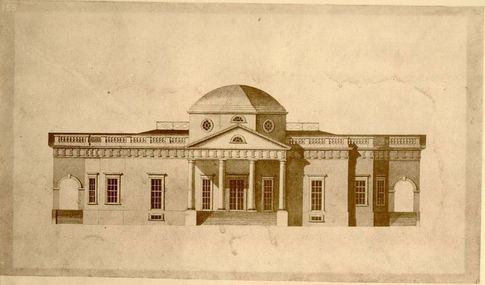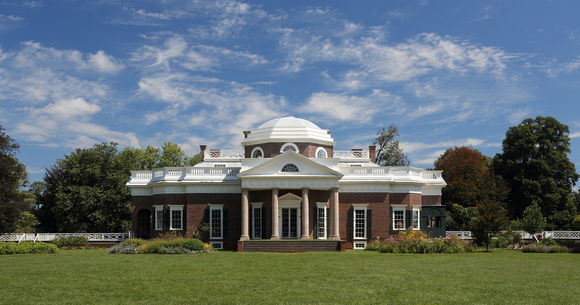
{ * } A drawing of an updated Monticello, by architect Robert Mills, circa 1803. Restoration and changes on it continued throughout Jefferson's own two Presidential terms until completed in 1809. The sketch has little resemblance to the finished work {at bottom of page}
In Jon Meacham's exceptional biography, Thomas Jefferson: The Art of Power, we meet a man so successful, and learned, and lively, that it's hard for me not to want to return to his world and reread it, and to know where to begin when looking at his contribution to the Enlightment's greatest project, America.
To try to encapsulate everything to be learned from him is probably impossible, but I can start with this brief list of 6 tactics and strategies employed by my favorite Founding Father. Whether you're like Jefferson {a politician with hobbies of all things naturalism and astronomy} an artist, a creative, or you're running a business, I trust we can all benefit from looking at the second President's methods.
To try to encapsulate everything to be learned from him is probably impossible, but I can start with this brief list of 6 tactics and strategies employed by my favorite Founding Father. Whether you're like Jefferson {a politician with hobbies of all things naturalism and astronomy} an artist, a creative, or you're running a business, I trust we can all benefit from looking at the second President's methods.
Start Your Day Early
{ * } "The sun never sees him in bed, and his mind designs more than the day can fulfill, even his long day" - Margaret Bayard Smith {wife of Samuel Harrison Smith, a close friend of Jefferson}, on a 66-year-old Jefferson
{ * } Each morning, Jefferson splashed cold water on his face. This was the first thing he did, a habit which he began at the beginning of his life and continued into old age.
{ * } Each morning, Jefferson splashed cold water on his face. This was the first thing he did, a habit which he began at the beginning of his life and continued into old age.
Exercise & Take Walks Daily
{ * } "He drove his horses hard and fast and considered the sun his 'almighty physician,'" writes Meacham.
{ * } Throughout his entire life, Jefferson drank no hard liquor and abstained from any form of tobacco. He walked as much as ten miles a day, enjoyed hunting, horseback riding, and gardening.
{ * } Throughout his entire life, Jefferson drank no hard liquor and abstained from any form of tobacco. He walked as much as ten miles a day, enjoyed hunting, horseback riding, and gardening.
Keep a Journal and Library & Constantly Expand Them
{ * } In his commonplace book, Jefferson copied down passages from Ossian's poems, usually of heroes and battles, which Meacham contends "spoke to height and power and fame and adventure."
{ * } When Thomas Jefferson founded the University of Virginia in 1819 he sold his private library to help pay the start up's cost. By then, it had amassed to 6,487 books.
{ * } When Thomas Jefferson founded the University of Virginia in 1819 he sold his private library to help pay the start up's cost. By then, it had amassed to 6,487 books.
Find Your Heroes, But Don't Worship Them Blindly
{ * } Jefferson had a trinity of portraits of the "greatest men the world had ever produced": Sir Francis Bacon the philosopher, Sir Isaac Newton the scientist, and John Locke the philosopher. He also collected paintings of key American characters { Christopher Columbus, Sir Walter Raleigh, and Americus Vespucius}, which he kept in his office and library.
{ * } Later in life though, Jefferson spoke wearily of supersitious aggrandizement of the past. In particular, if future American's would "give imaginary value to this relic [his writing desk], for its association with the Great Charter of Our Independence." Notice though he isn't against greatness as such, in this case the Declaration of Independence, but rather false idolization of inconsequential objects. It isn't the desk that is great, but the ideas penned atop it.
{ * } Later in life though, Jefferson spoke wearily of supersitious aggrandizement of the past. In particular, if future American's would "give imaginary value to this relic [his writing desk], for its association with the Great Charter of Our Independence." Notice though he isn't against greatness as such, in this case the Declaration of Independence, but rather false idolization of inconsequential objects. It isn't the desk that is great, but the ideas penned atop it.
Architect The Future You Want
{ * } Playing the savvy American diplomat in Paris to secure allegiances, Jefferson wrote this about many of his acquaintances' habits:
"After supper cards; and after cards bed, to rise at noon the next day, and to tread like a mill horse, the same trodden circle over again. Thus the days of life are consumed, one by one, without an object beyond the present moment: ever flying from the arms...eternally in pursuit of happiness which keeps eternally before us. If death or bankruptcy happen to trip us out of the circle, it is a matter for the buzz of the evening, and is completely forgotten by the next morning."
Years earlier, he had this to say on overcoming obstacles:
"The most fortunate of us all in our journey though life frequently meet with calamities and misfortunes, which may greatly afflict us..." and "...to fortify our minds against the attacks of these calamities and misfortunes should be one of the principle studies and endeavors of our lives."
When calamity and misfortunate attacked in 1770, in the form of his Shadwell home burning to the ground, the twenty-seven-year-old threw his focus onto designing a new home, growing a garden, and restoring his library. That home would be Monticello {Italian for little mountain}, which was inspired by a Roman temple he sighed in Nimes, France years earlier.
"After supper cards; and after cards bed, to rise at noon the next day, and to tread like a mill horse, the same trodden circle over again. Thus the days of life are consumed, one by one, without an object beyond the present moment: ever flying from the arms...eternally in pursuit of happiness which keeps eternally before us. If death or bankruptcy happen to trip us out of the circle, it is a matter for the buzz of the evening, and is completely forgotten by the next morning."
Years earlier, he had this to say on overcoming obstacles:
"The most fortunate of us all in our journey though life frequently meet with calamities and misfortunes, which may greatly afflict us..." and "...to fortify our minds against the attacks of these calamities and misfortunes should be one of the principle studies and endeavors of our lives."
When calamity and misfortunate attacked in 1770, in the form of his Shadwell home burning to the ground, the twenty-seven-year-old threw his focus onto designing a new home, growing a garden, and restoring his library. That home would be Monticello {Italian for little mountain}, which was inspired by a Roman temple he sighed in Nimes, France years earlier.



















